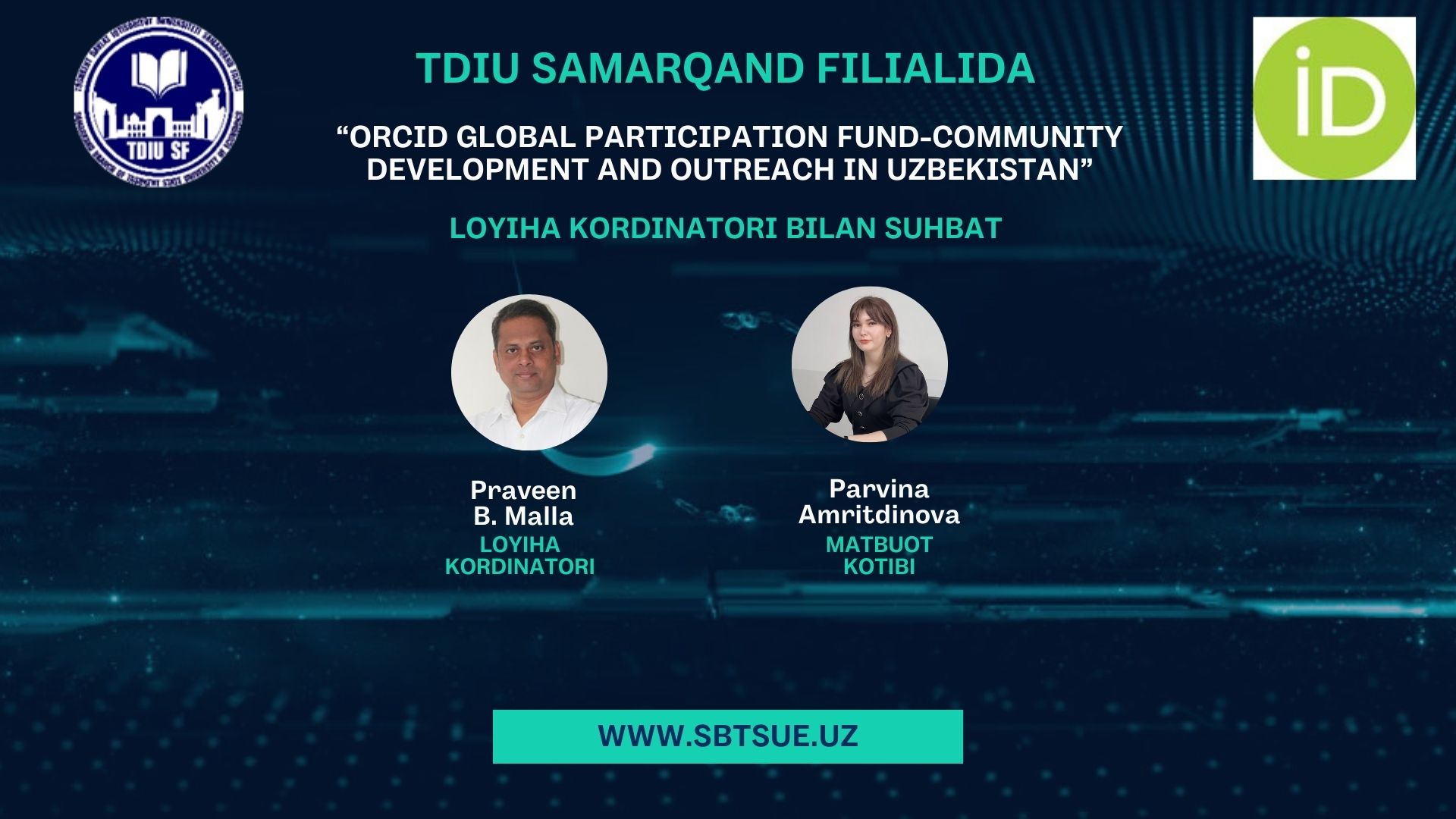
The press service of the branch held another interview with the coordinator of the "ORCID Global Participation Fund-Community development and Outreach in Uzbekistan" project.
Parvina Amritdinova: Congratulations on being a winner of the ORCID Global Participation Fund!
Praveen Malla: Thank you very much!
Amritdinova Parvina: How did you get this financial grad project?
Praveen Malla: As Zafar Abdullayev said, we participated in this competition in September 2023 and were declared the winner in January 2024. I think that the main reason for our winning the grant was our carefully developed plans, which showed our solidarity and determination as a university to create an ORCID community of practice in Uzbekistan.
Amritdinova Parvina: But why this particular project?
Praveen Malla: As a foreign professor working in Uzbekistan, I look at Uzbekistan's higher education with a new and impartial eye. Over the past three years, many changes have taken place in the ecosystem of Uzbekistan's universities. Through my extensive contacts with public and private universities in Uzbekistan, I must say that I am proud to have witnessed these changes. Thus, the ORCID Foundation announced its competition for the countries of the world, especially the countries of the South, and we saw the need to take advantage of this opportunity.
Amritdinova Parvina: What changes do you see in the higher education system of Uzbekistan?
Praveen Malla: Well, a lot. A number of famous people who we have witnessed in Uzbekistan's higher educational institutions are strengthening internationalization. Universities - both public and private - are increasingly attracting foreign professors, and student enrollment statistics indicate a large number of foreign students on Uzbek soil. I think it's a big deal. I also see the gradual adoption of English as the language of instruction. Many universities now offer some programs in English. This is a great change, even if it is difficult for the universities. In addition, I see a trend of top-down pressure to publish in Scopus-indexed journals, participate in THE and QS ranking exercises, innovate in pedagogy, and rely on technology. educational processes, building a comprehensive e-library and enabling students to easily access content, incubating entrepreneurial cells and helping student entrepreneurs move from idea to commercialization, etc.
This is just the beginning of long-term reforms in the higher education ecosystem in Uzbekistan. All of the things I have just mentioned and many more such innovations in educational governance will continue to emerge as the government moves to 'compulsory accreditation' for HEIs. This will fundamentally change the higher education system of Uzbekistan.
I am sure that Uzbekistan is taking all the right steps and will soon change the higher education system and become a major educational center in Central Asia. It is interesting that Uzbekistan has both population and communication opportunities to become one of the countries with the leading education system in the Central Asian region.
Amritdinova Parvina: What is the main essence and significance of this project?
Praveen Malla: Today, Uzbekistan is undergoing major economic reforms. The government of Uzbekistan has initiated many reforms to make the country attractive for foreign investments. Great attention is being paid to improving the quality of higher education in your country in order to accelerate the process of training competent, mature personnel in order to meet the needs that may arise due to reforms.
For this purpose, the government not only grants licenses to the new generation of private, international universities, but also pays special attention to the modernization of state universities. Universities are struggling to adopt the Western model of higher education, and the government is actively encouraging universities and academics with active research portfolios.
Uzbek academics are beginning to realize that they can no longer work in the shadow of their colonial legacy, but that academics must take their place in the world through quality research and good publications in SCOPUS-indexed journals accordingly. At the same time, there is a gap between the fields of pedagogy, research and industry in Uzbekistan. ORCID is an object in the higher education ecosystem of Uzbekistan that is still unknown to many. Very few academics have heard of ORCID or have research accounts with ORCID. ORCID's requirements, benefits, and capabilities match us, and we value the unique system of profiling and certifying researchers to protect their work. As more universities get licenses to operate in Uzbekistan, more researchers/academics enter Uzbekistan's higher education institutions. Our goal is to guide them in the right direction to prevent them from being exploited by fake and secondary publishers. We see ORCID as the basis for the most reliable publishers, in the case of fake and secondary publishers, and therefore actively promoting the ORCID program is in the best interests of all higher education systems in Uzbekistan.
Amritdinova Parvina: Judging from your answer, this is a very important project. But what is ORCID and why is ORCID important for Uzbek universities and Uzbek academics?
Praveen Malla: My colleague Rafieva Bunafsha will answer this question. He is the person responsible for all our communications with ORCID. (SPOC). I ask you to have a close conversation with that person. He can explain this topic in detail and explain the importance of ORCID in the conditions of Uzbekistan.
Parvina Amritdinova: Of course. Thank you for your time.
Praveen Malla: Cheers.
(Prof. Praveen B. Malla, professor of the Department of Digital Economy and Information Technologies, Samarkand Branch of Tashkent State University of Economics and coordinator of this project).